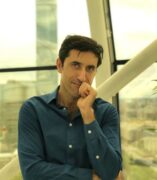
Mehdi Amouei Torkmahalleh, PhD
Assistant Professor
Environmental and Occupational Health Sciences
Email:
CV Link:
About
Dr. Mehdi Amouei Torkmahalleh joined the division of Environmental and Occupational Health Sciences (EOHS) at University of Illinois at Chicago (UIC) in August 2022. He received his B.Sc. degree in chemical engineering from the University of Tehran, Iran, in 2005 and his M.Sc. in biochemical engineering from Amirkabir University of Technology, Iran, in 2008. He completed his Ph.D. in chemical engineering under the supervision of an internationally recognized aerosol chemist, Prof. Philip Hopke at Clarkson University, the USA, in 2013. After completing his Ph.D., he joined the Middle East Technical University Northern Cyprus Campus (METUNCC) as a visiting assistant professor in chemical engineering for two years. In August 2015, Professor Torkmahalleh moved to Kazakhstan as an Assistant Professor in Chemical Engineering at Nazarbayev University. He spent about seven years in Kazakhstan, and then in 2022, he joined UIC. Dr. Torkmahalleh’s primary research interest is to assess community exposure to ultrafine particles from indoor, workplace, and anthropogenic sources and examine the associations between these exposures and neurodegenerative diseases. He is one of the leading scientists in the field of exposure to cooking emissions, with numerous publications in this field that has introduced new methods to reduce cooking emissions and understand its nervous and cardiovascular impact. He recently published the Cooking Aerosol chapter for the Handbook of Indoor Air Quality by Springer
Given his chemical engineering background, he has also studied the atmospheric chemistry of hexavalent chromium and aerosol nucleation using Molecular Dynamics Simulation and Aspen Plus commercial software.
Dr. Torkmahalleh supervised several graduate theses at M.Sc. and Ph.D. levels and was involved in many international research studies. He published numerous articles jointly with scientists from all over the world. In 2021, he led a study coauthored by more than 50 scientists that addressed the impact of the COVID-19 pandemic on global air quality. He is also interested in novel topics such as sustainability, green buildings, smart buildings, climate change, global health, environmental equity, and citizen science.